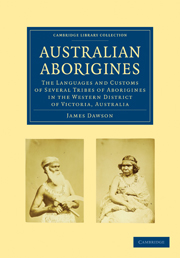 Australian Aborigines
Australian Aborigines Book contents
- Frontmatter
- PREFACE
- INTRODUCTORY NOTE
- Contents
- YARRUUN PARPUR TARNEEN
- CHAPTER I TRIBES
- CHAPTER II POPULATION
- CHAPTER III CHIEFS
- CHAPTER IV PROPERTY
- CHAPTER V CLOTHING
- CHAPTER VI HABITATIONS
- CHAPTER VII CLEANLINESS
- CHAPTER VIII DOMESTIC FURNITURE
- CHAPTER IX COOKING AND FOOD
- CHAPTER X TOOLS
- CHAPTER XI LAWS OF MARRIAGE
- CHAPTER XII CHILDREN
- CHAPTER XIII NAMES OF PERSONS
- CHAPTER XIV SUPERSTITIONS AND DISEASES
- CHAPTER XV DEATH AND BURIAL
- CHAPTER XVI AVENGING OF DEATH
- CHAPTER XVII GREAT MEETINGS
- CHAPTER XVIII AMUSEMENTS
- CHAPTER XIX WEAPONS
- CHAPTER XX ANIMALS
- CHAPTER XXI METEOROLOGY, ASTRONOMY, ETC
- CHAPTER XXII NATIVE MOUNDS
- CHAPTER XXIII ANECDOTES
- CONVEYANCE, BY PRINCIPAL CHIEFS TO JOHN BATMAN, OF 100,000 ACRES OF LAND, BETWEEN GEELONG AND QUEENSCLIFF
- VOCABULARIES.—WORDS; ANIMALS; RELATIONSHIPS; NAMES OF PLACES; GRAMMAR AND SENTENCES; NUMERALS
- NOTES
- Frontmatter
- PREFACE
- INTRODUCTORY NOTE
- Contents
- YARRUUN PARPUR TARNEEN
- CHAPTER I TRIBES
- CHAPTER II POPULATION
- CHAPTER III CHIEFS
- CHAPTER IV PROPERTY
- CHAPTER V CLOTHING
- CHAPTER VI HABITATIONS
- CHAPTER VII CLEANLINESS
- CHAPTER VIII DOMESTIC FURNITURE
- CHAPTER IX COOKING AND FOOD
- CHAPTER X TOOLS
- CHAPTER XI LAWS OF MARRIAGE
- CHAPTER XII CHILDREN
- CHAPTER XIII NAMES OF PERSONS
- CHAPTER XIV SUPERSTITIONS AND DISEASES
- CHAPTER XV DEATH AND BURIAL
- CHAPTER XVI AVENGING OF DEATH
- CHAPTER XVII GREAT MEETINGS
- CHAPTER XVIII AMUSEMENTS
- CHAPTER XIX WEAPONS
- CHAPTER XX ANIMALS
- CHAPTER XXI METEOROLOGY, ASTRONOMY, ETC
- CHAPTER XXII NATIVE MOUNDS
- CHAPTER XXIII ANECDOTES
- CONVEYANCE, BY PRINCIPAL CHIEFS TO JOHN BATMAN, OF 100,000 ACRES OF LAND, BETWEEN GEELONG AND QUEENSCLIFF
- VOCABULARIES.—WORDS; ANIMALS; RELATIONSHIPS; NAMES OF PLACES; GRAMMAR AND SENTENCES; NUMERALS
- NOTES
Summary
Every tribe has its chief, who is looked upon in the light of a father, and whose authority is supreme. He consults with the best men of the tribe, but when he announces his decision, they dare not contradict or disobey him.
Great respect is paid to the chiefs and their wives and families. They can command the services of everyone belonging to their tribe. As many as six young bachelors are obliged to wait on a chief, and eight young unmarried women on his wife; and, as the children are of superior rank to the common people, they also have a number of attendants to wait on them. No one can address a chief or chiefess without being first spoken to, and then only by their titles as such, and not by personal names, or disrespectfully. Food and water, when brought to the camp, must be offered to them first, and reeds provided for each in the family to drink with; while the common people drink in the usual way. Should they fancy any article of dress, opossum rug, or weapon, it must be given without a murmur.
If a chief leaves home for a short time he is always accompanied by a friend, and on his return is met by two men, who conduct him to his wuurn. At his approach every one rises to receive him, and remains silent till he speaks; they then inquire where he has been, and converse with him freely.
- Type
- Chapter
- Information
- Australian AboriginesThe Languages and Customs of Several Tribes of Aborigines in the Western District of Victoria, Australia, pp. 5 - 6Publisher: Cambridge University PressPrint publication year: 2009First published in: 1881


